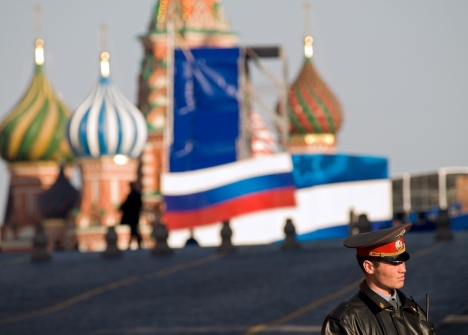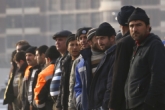
Ethnic tensions in Russia occasionally spill over into violence. Source: AFP / East News
Russian President Vladimir Putin identified a number of key public safety concerns Monday, instructing officials to focus on extremism, ethnically aligned criminal groups and illegal migration, following a pattern in which Russian officials have been suggesting a link between the three.
“Among the key tasks facing the law enforcement authorities, I would single out … the fight against ethnic and religious extremism. We must harshly suppress the activities of organized criminal groups formed along ethnic lines,” Putin told a meeting of senior security officials, according to a transcript on the Kremlin’s website.
“We should also fully implement our decisions regarding the struggle with illegal migration, including the tightening of relevant laws,” he added a bit later.
The meeting, in which Putin also called for better road safety and concrete deliverables instead of bureaucratic jargon, focused on socio-economic development. It was attended by the ministers of defence, interior, foreign affairs, justice and emergency situations.

Moscow mayor speaks out against migration from Central Asia
Illegal migrants may be banned from entering Russia for 10 years
Fear rife among Russian middle class when it comes to immigration
Russia depends heavily on migrant labourers, mostly from former Soviet republics in Central Asia and the Caucasus, but public opinion about their effects on crime rates and employment opportunities has gotten more negative over the past decade.
The comments by Putin are the latest in a series of remarks by senior Russian officials highlighting the risks of under-regulated migration, and drawing a link between migration and extremism.
A deputy head of the Federal Security Service (FSB), Alexander Roshchupkin, warned on May 30 that illegal migration poses a national security threat as a channel for militants and foreign intelligence agents. On the same day, Moscow Mayor Sergei Sobyanin, who is seeking re-election in September, said that migrant workers should not be encouraged to settle down in the capital.
About 60 percent of Russia’s 5 million migrant workers are in the country illegally, the Federal Migration Service said in March.
Putin also called on Monday for the development of a “civilized migration policy.”
“We are ready to attract qualified foreign specialists,” he said. “But these people should be adapted to life in Russia, should know the Russian language, the history of our country, the basics of our laws, and respect our traditions.”
Ethnic tensions in Russia occasionally spill over into violence. In December 2010, a rally involving thousands of nationalists outside the Kremlin ended in mass detentions and several deaths; they had been protesting the release from police custody of a young man from the North Caucasus – a part of Russia – suspected of killing an ethnic Slav football fan.
On Saturday, three people were detained when hundreds of nationalists protested in a “day of Russian rage” in the town of Udomlya in Tver Region, not far from Moscow. The gathering followed an earlier clash between locals and people identified by police simply as “from southern Russian republics,” but, judging by comments in local online media, from the North Caucasus.
First published in RIA Novosti.
All rights reserved by Rossiyskaya Gazeta.
Subscribe
to our newsletter!
Get the week's best stories straight to your inbox